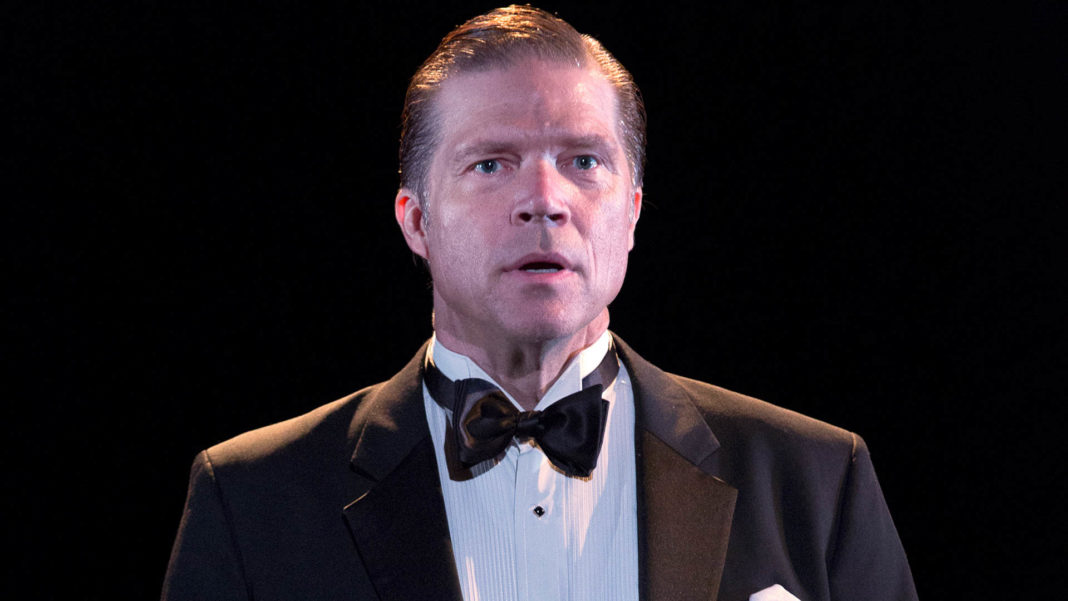“I’ve always embraced the most difficult kind of repertoire and I’ve been really happy with it,” says baritone Rod Gilfry when talking by phone about his role in David Lang’s The Loser. “I’ve had great experiences when taking on new things. There’s also the added benefit of not having any precedent. It’s a great thing to sing Verdi, Mozart or Wagner, but you’re always dealing with the people who’ve come before. I like to have the freedom to have a completely open book – a tabla rasa. It’s a very freeing feeling going into it.”
This Friday and Saturday, Gilfry plays the Narrator in The Loser at the Theatre at the Ace Hotel. This is part of LA Opera’s Off-Grand program. The production, directed by Lang, originated at the Brooklyn Academy of Music in 2016. It’s one act and it finds Gilfry on a platform above the orchestra section and playing to the upper levels of the theatre.
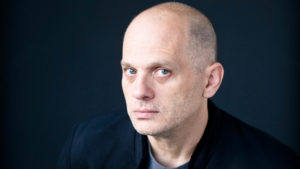
Lang based The Loser on the novel of the same nam by Thomas Bernhard. As the Narrator, Gilfry assumes the role of the person revealing the story of the time when the Narrator, his friend Wertheimer and pianist Glenn Gould were part of a master class taught by Vladimir Horowitz. Seeing how brilliant Gould was, the other men realized they would never measure up. As the story begins, Wertheimer has committed suicide.
“I would say this definitely takes the place of therapy,” Gilfry says about the libretto. “He can figure out Wertheimer, he thinks he’s got Glenn Gould figured out. If you look back at anther couple steps, all of them are Thomas Bernhard. He took the character of Gould to be similar to himself and another to be the offshoot of his personality. You have Bernhard represented in three branches – the three faces of Thomas. It’s very much a self-taught therapy.”
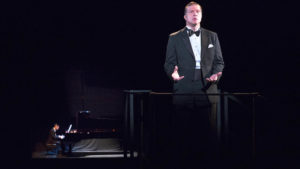
The opera employs a shadowy figure on the piano (Conrad Tao) who may be Gould or the spirit of the musician. Gilfry said just the concept alone intrigued him and particularly how Lang wanted to stage The Loser.
“I thought the ideas were so audacious. The first idea was that I would be suspended. But I don’t think I could do that for an hour. But the concept of it – being that the performer is directly in front of the mezzanine, the orchestra is empty and the main stage is dark – this all sounded really intriguing and something I’d like to try.”
Though Gilfry has performed other modern work (by composers Matthew Aucoin and Jake Heggie as examples), he says Lang’s post-minimalist work is a whole different challenge.
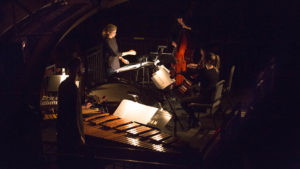
in “The Loser” (Photo by Richard Termine/Courtesy of BAM)
“In the first movement the time signature is always changing and the orchestra is fragmented. There’s only a four-piece orchestra with sparse orchestration. One instrument is pizzicato and plays rarely. And the vocal line is really fragmented. It’s very challenging to memorize. The thing that’s so wonderful about David’s music is the story and words are in bold relief.”
Gilfry has to be very still initially, the opposite of what is normally expected of opera stars.
“As we were working on it, David had this idea – be absolutely still for the first scene. You have a lot of silence where you have 4-6 beats of absolutely nothing and the last word you say fills the air. And you have the tendency to try and fill it in. But I realized that was completely the wrong approach for David’s music. It’s anathema to the way he composes and the life of his music. ”
What is ultimately revealed is not so much material information about Gould or Wertheimer, but more clearly a sense of the Narrator and his own feelings about being an artist. The Narrator’s struggle, Gilfry says, is not one that he has faced.
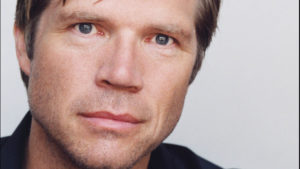
“I’ve never really tried to be an artist. I’ve just sort of done my own thing. I have felt competition with colleagues to be as much as an artist as I have seen some of my colleagues – the famous singers throughout the ages. Most of my competition has been my own mental feeling. I’ve never felt like I’m not an artist, but I’ve never felt like I am.”
Precisely as he finishes the last sentence he realizes that he’s wearing a t-shirt that says “LA – Los Artists.” A big laugh comes forward from that baritone voice that Gilfry thinks may wrongly have been placed where it was.
“Something I discovered, but I had from the very beginning, is a very good low range. I have great range for someone who sings as lyric baritone. I feel misplaced. I have this whole other part that rarely gets explored. When [David and I] first started working, we just started singing through stuff. He wanted to learn my voice. I guess I came in singing a few low notes, so he wrote the whole thing around that.”
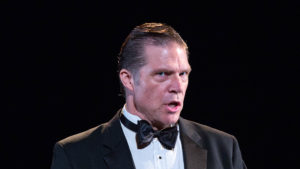
So challenging is this part that Gilfry has counted how many words there are. But it very clear that the degree of difficulty and the unique qualities of Lang’s writing compel Gilfry to continue to perform The Loser.
“I’m right up there in the face of the audience. It’s almost like doing a cabaret show only it’s highly-scripted and it’s much harder music. As much as I have complained about the difficulty, it’s not like anything you’ll hear from any other composer. The vocal line starts out extremely fragmented, but by the end the words get extremely compressed. There are 3,894 words in this little piece. That’s a big task.”
All production photos courtesy of BAM/ Photos by Richard Termine











